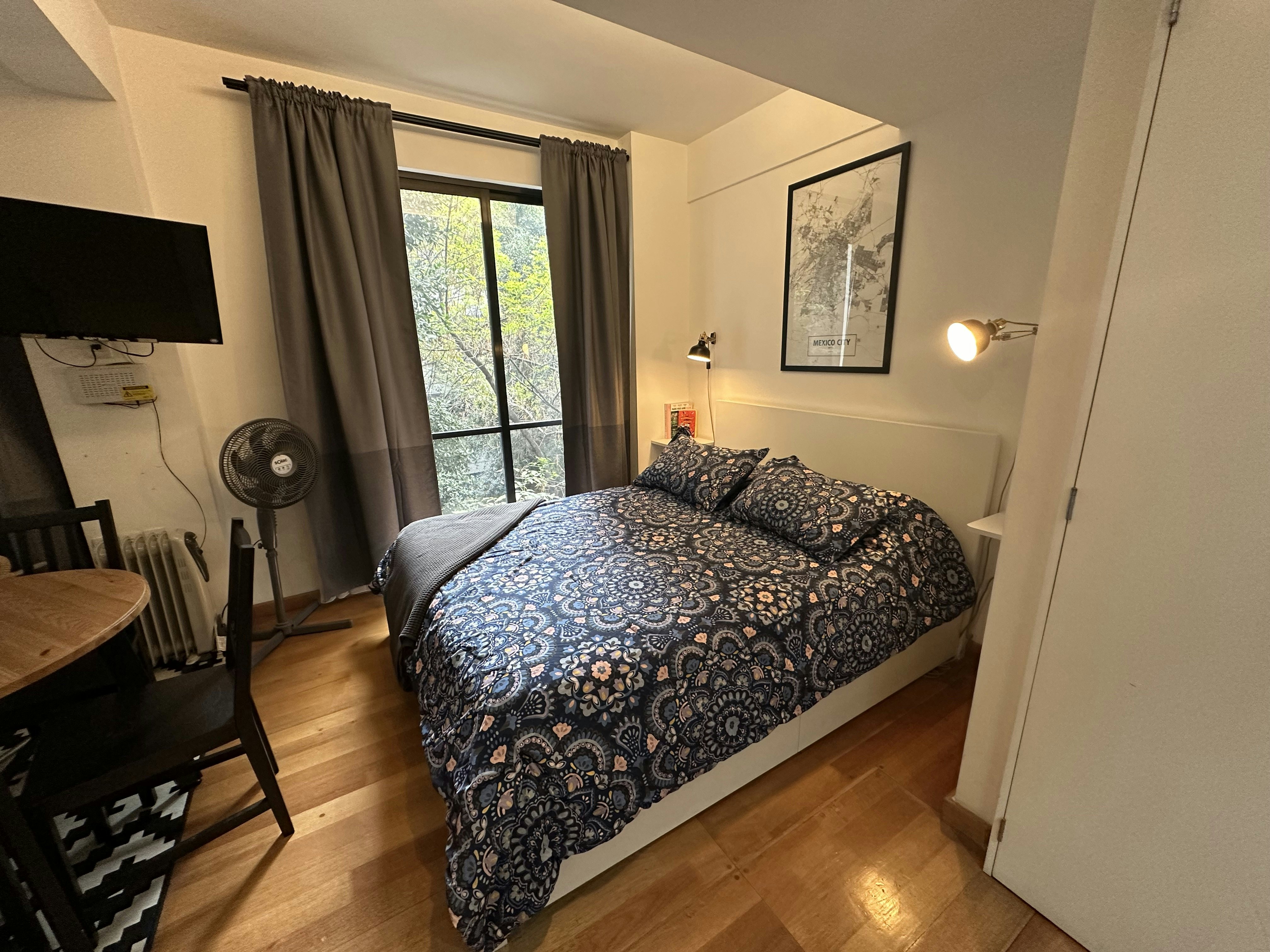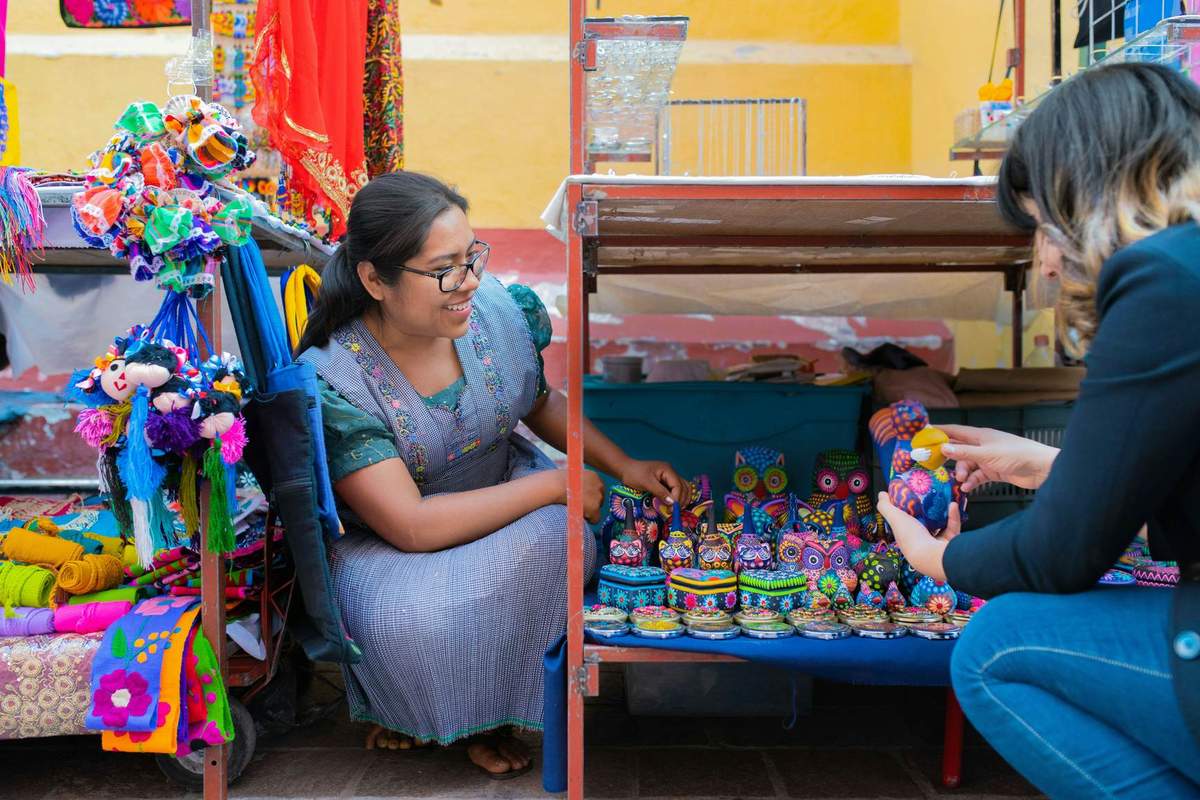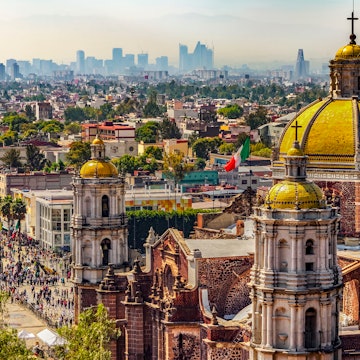
Want to work remote from abroad? Some thoughts after a month in Mexico City

Feb 2, 2024 • 10 min read

Working remote while traveling gives you the opportunity to slow down and enjoy the city you're visiting. © Melissa Yeager/ Lonely Planet
Have you ever had the itch to just put all your stuff in storage and move temporarily to another country? Yep. Same.
This is exactly the feeling that draped over me last fall when the days were ticking down on my lease and my landlord sent me a generous offer to increase my rent. As someone with the luxury of working remote, I questioned myself on why I wasn't seizing this opportunity to slow travel through some of the places I longed to spend more time knowing. This then propelled me into a fury of research about which of those spots were also digital nomad-friendly destinations.
It seemed like a sign that the timing was right to pack up, put my stuff in storage, and spend some time immersing myself in another country (with the help of a company that took the reigns of the planning logistics for me) before figuring out a place to settle more long term.
I chose Mexico City thanks partially to its location in a similar time zone as my current work hours, partially for its reputation for being a dynamic place, full of great food, art and things to do, and fully because of the gorgeous weather in January.
It’s my second stint living outside my home country for an extended stretch– but my first time doing more than a few days here and there working remotely. Here are a few of my reflections on my experience if you are considering doing the same.
There are quite a few logistics but it is worth it

First, you have to decide where to go and for how long. As you're deciding, I highly recommend checking out Joel Balsam's incredibly thorough breakdown of digital nomad-friendly countries because he includes the costs involved and most importantly, the reliability of the internet. He offers some great thoughts from his ten years on the road to consider. (Lonely Planet also has a digital nomad handbook to help with planning as well.)
There’s a fair amount of preparation involved. For me, it was putting my stuff in storage, finding someone to care for my pup, putting some of my subscriptions on hold, forwarding my mail, seeing if my SIM card would work in Mexico, did I need a visa, medical/trip insurance, tax rules, best neighborhood for my interests, the guarantee of reliable high-speed internet, flights, what to pack – you get the picture.
My advice is also to ask yourself questions about what you need to effectively work and live in another country. Do you need to be working on the same hours as you would back home? What kind of accommodations do you need to feel comfortable? Is this your first time traveling abroad? Are you ok if you don’t speak the language? Are you willing to learn? What amenities do you need to feel comfortable? (For instance, for me, I need a place to work out and a walkable distance to grocery shopping.)
It can feel like a lot of spinning plates but some services will help do the heavy lifting on planning -- I’ll get to later in this article and offer a review of one I used.
Read your employee handbook, talk to your employer
Even if you’re not fully remote, don’t despair! You may still have opportunities to do a working trip abroad. Review your company handbook and read the policies as some employers offer working sabbaticals after a certain number of years with the company or seniority level. This would allow you to work remotely for a few weeks before returning to the office. If your company doesn’t have such a policy, it’s also worth talking to your employer and perhaps negotiating for it as a perk or if you can combine it with some of your paid time off. A few of the people I met in Mexico City were not fully remote, but their companies had policies that allowed 6 to 8 weeks of working remote outside their home country each year.
If you are fully remote, not to be a buzz kill, but still review your company policies and make sure to run this by your employer as well. I work at a company whose full purpose is travel and I still had a conversation with my bosses. Here’s why: working during your visit could trigger international business taxes, violate international business agreements you may be unaware your company has, as well as, based on the country you decide to work from, violate certain sanctions your country has imposed.
You might think you can dip out of the country without them knowing but trust me – the tech gods will reveal all. I have heard dozens of stories lately of people losing their jobs over it or forced to book an expensive and immediate flight home. So save yourself the worry and make sure you know your company’s policies before you leave.
Expect culture shock
Whether you’re well-traveled or you're living abroad for the first time, you’ll likely to some degree experience culture shock. There’s a lot of new experiences coming at you. You may struggle with the language or remembering to have the right currency. Housing conditions may be different than you are used to. Traveling abroad always demands a degree of flexibility, but even more so when you decide to live in a different country and you have to navigate your day-to-day life.
Just know culture shock doesn’t always manifest itself as “homesickness.” The most common symptom is feeling fatigued or having trouble sleeping. (This is how it manifests for me – I’m usually pumped to experience all the new things – but then exhaustion from being alert to new experiences sets in.)
You might also have anxiety or feel generally uncomfortable at times. You might get cranky. These are all very normal, human feelings. Be sure to acknowledge them and grow from them while also taking care of yourself.
Seize the opportunity to learn another language.
Of course, one way to feel more comfortable is to learn the language. (It's also polite to your host country.) I hired a language tutor to refresh my long-forgotten Spanish and spent 3 hours a week in classes. It was incredibly helpful to have someone to go to where I could say "Hey, I encountered this situation and I didn't know what to say" and have someone guide me through what I should know for next time.
Some friends used Walk Spanish, a language class that teaches through tours of the city in the morning while also learning Spanish. Doing mundane things like going to the grocery store, going to a gym class or working in a cafe became an opportunity for me to practice my language skills. See what's available in the country where you plan to stay.
A highlight: everyday adventures

Along with visiting museums and tourist spots after work and on weekends, I also dropped by new-to-me panaderías for breakfast after taking in a spin class and checked out an awesome bookstore called Cafebrería de Péndulo. I had the flexibility of waiting to get that prized reservation at Pujol and got a walk-in spot at the bar for the famed tuna tostadas at Contramar. I was around to see the city open up its streets for its beloved Sunday bike rides and could wander through markets I stumbled upon in my normal routine around the city.
Instead of packing my itinerary full – I could add in activities here and there and see more of the city in a more manageable way.
That said, take a few days off to be a tourist.
I regret not taking more days off. It can be a bit exhausting to be working full-time and trying to see a new city. I’ll admit – for a few days I really had to convince myself to go out because all I wanted to do was sit and decompress while watching Netflix after work. I felt tremendously guilty just ordering off Rappi (Mexico's food delivery app) for the evening with a whole exciting city just outside my door.
Also, when you’re working you may feel like you’re on vacation but you’re not. My advice is to consider taking some time off so you can truly have the energy to see the things you want to. (That said, don’t beat yourself up if you need to rest.)
Services to book everything

Like I said before, there are many logistics to consider and with a bunch going on in my life at the time, I decided to tap into one of the services that have popped up to help remote workers with planning a digital nomad adventure. I probably could have booked all of this myself, but it was nice to just handle the logistics of moving out of my apartment and have someone else handle the planning.
Much like a vacation tour, they set up what you need for the trip – a short-term apartment, community workspace, and social events/tours.
I used a company called Remote Year which plans one-month stays along with 4 to 12-month journeys where you visit a different country each month. (I should note here Remote Year did not invite me and was not aware I was from Lonely Planet when organizing my stay, which I also paid for with my own money.)
A brief review here as I know others are wondering about Remote Year: I booked a one-month program and it worked out great for me personally, simplifying the planning process and allowing me to tap immediately into a social network.
There were about 25 people in the group, with a range of ages (20s to late 60s in my group), nationalities, and interests, making it easy to always find someone to hang out with. Group chats were constantly buzzing with people looking – and finding – others to see the city with. Since you saw the same faces on each tour, I felt it was easier to naturally develop friendships.
I received a pre-trip questionnaire to find my housing and attended a couple of preparation webinars before arriving. I booked a solo apartment and felt my accommodations matched what I asked for, a comfortable studio in a walkable part of the trendy Roma Norte neighborhood with a nice kitchen and lots to see and do nearby.

But you are trusting someone else to decide for you based on that questionnaire. If that makes you uncomfortable, you may want to book your own rental. With Remote Year, I only knew where I was staying 5 days in advance of arriving and did not have pictures/list of amenities before arriving.
Some people I spoke with – most of whom had either traveled with the program before or were on the 4-month program and thus had experienced several housing offerings – said their experience with accommodations vastly varied, some spectacular, some not so great. One told me they felt the company was originally founded for early career workers but now, post-pandemic, was a bit slow adapting to their new wave of clients, many more mature professionals who desired better living accommodations.
That said, it met my expectations and, in my group of travelers, I met a substantial number of repeat Remote Year users. I was pleased with the ease of wrapping up logistics in one stop. It was also an example of where traveling solo does not mean traveling alone and I felt like part of a community within the first week.
Overall, I believe it's a great option to consider based on your circumstances. If you’re short on time to plan or want to go to a country you're unfamiliar with, tapping into someone’s local knowledge and an instant social network may lift some of the stress, helping you acclimate and find a sense of community quicker.















